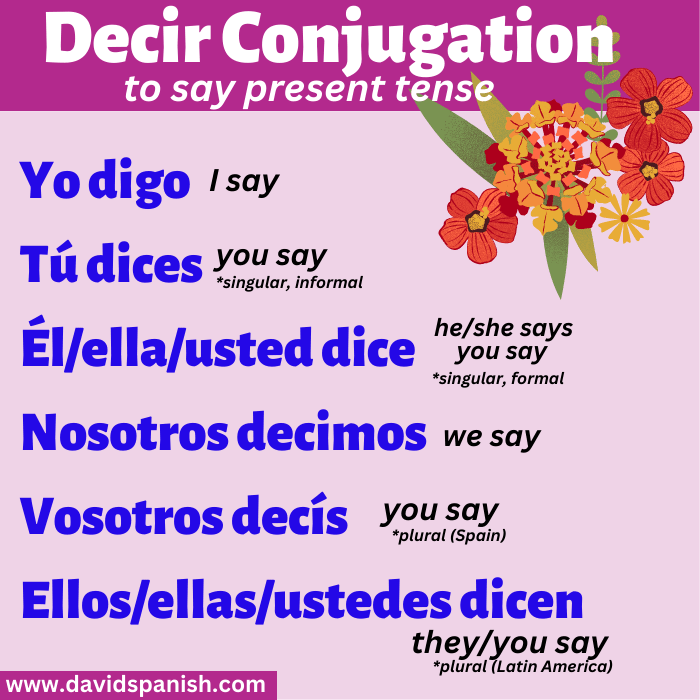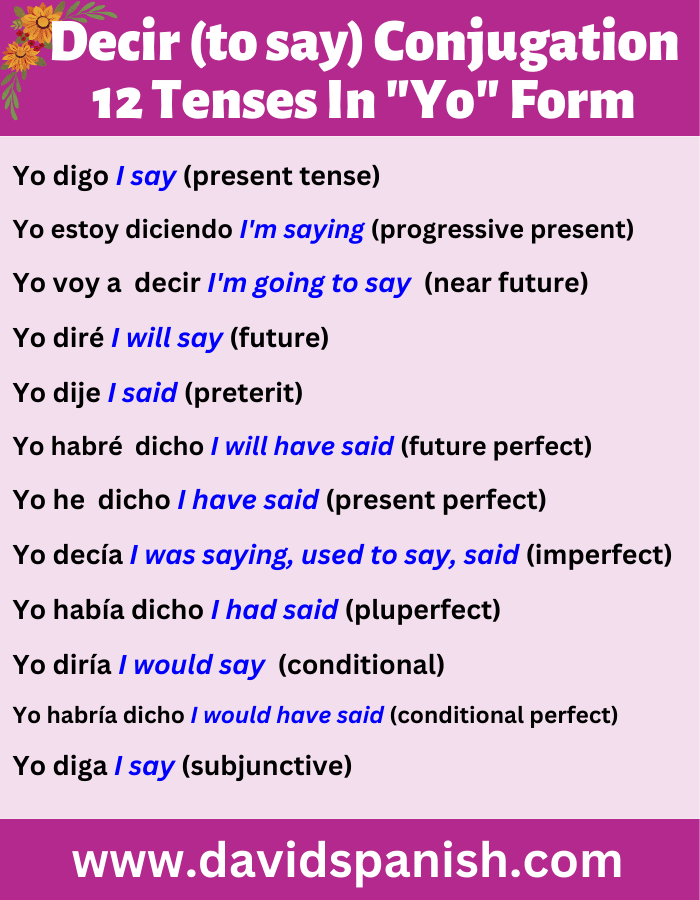Decir (Meaning: to say, to tell) is a essential Spanish verb for all students. The conjugation of decir in the present tense is: Yo digo (I say), tú dices (you say), él/ella/usted dice (he/she says, you say), nosotros decimos (we say), vosotros decís (you say) and ellos/ellas/ustedes dicen (they say).

Decir is an irregular IR verb. While its endings are the same as all other regular IR verb when conjugated in the present tense, its stem changes. This page on our site covers irregular and regular Spanish IR verbs in detail.
Decir conjugated in the present tense

Further down the page we provide conjugation charts for decir for the following commonly used Spanish verb tenses:
- Present tense (presente de indicativo)
- Progressive present (presente progresivo)
- Near future (futuro inmediato)
- Future tense (futuro)
- Preterite (pretérito)
- Present perfect indicative (perfecto de indicativo)
- Imperfect (imperfecto de indicativo)
- Conditional (potential simple)
- Present subjunctive (presente de subjuntivo)
- Imperative (imperativo)
Decir conjugation table

The following graphic shows conjugations for decir in the first-person singular (yo) form in the present tense.

Decir conjugation charts
Present tense (presente de indicativo)
In the present tense, yo digo translates to “I say” and “I am saying”.
| yo digo | I say | ¡Digo la verdad! | I'm saying the truth. |
| tú dices | you say | ¿Por qué dices esto? | Why are you saying this? |
| él/ella, usted dice | he/she says, you say | Dice que quiera quedarse aquí. | He's saying that he wants to say here. |
| nosotros decimos | we say | ¡Decimos la neta, guey! | We're saying the truth, dude! |
| nosotros decís | you say | ¿Qué decís? ¡No entiendo! | What are you saying? I don't understand. |
| ellos/ellas, ustedes dicen | they/you say | ¿Por qué no dicen lo que ocurrió? | Why aren't they saying what happened? |
Progressive present (presente progresivo)
The progressive present tense combines the present tense of estar (to be) with the present participle. Yo estoy diciendo translates to “I am saying”.
| yo estoy diciendo | I am saying | ¡Estoy diciendo la misma cosa! | I'm saying the same thing! |
| tú estás diciendo | you are saying | ¿Qué estás diciendo? No entiendo. | What are you saying? I don't understand. |
| él/ella, usted está diciendo | he/she is saying, you are saying | Ella está diciendo que eres estúpido. | She's saying that you're stupid. |
| nosotros estamos diciendo | we are saying | ¡No estamos diciendo nada! | We're not saying anything! |
| vosotros estáis diciendo | you are saying | ¿Por qué estáis diciendo que la comida esta ricá? | Why are you saying the food is delicious? |
| ellos/ellas, ustedes están diciendo | they/you are saying | ¡Están diciendo que hablas bien español! | They're saying that you speak Spanish well! |
Near future (futuro inmediato)
The near future tense is formed by combining the verb ir (to go) conjugated in the present tense with the preposition a and an infinitive. Yo voy a decir translates to “I am going to say”.
| yo voy a decir | I am going to say | Te voy a decir algo importante. | I'm going to tell you something important. |
| tú vas a decir | you are going to say | ¿Qué vas a decirme? | What are you going to tell me? |
| él/ella, usted va a decir | he/she is (you are) going to say | No va a decir nada. | He isn't going to say anything. |
| nosotros vamos a decir | we are going to say | Vamos a decirle la verdad. | We're going to tell you the truth. |
| vosotros vais a decir | you are going to say | ¿Cuándo vais a decirnos lo que sucedió? | When are you going to tell us what happened? |
| ellos/ellas, ustedes van a decir | they/you are going to say | ¡Van a decirnos mentiras! | They're going to tell us lies! |
Future tense (futuro)
In the future tense, yo diré translates to “I will say”.
| yo diré | I will say | Te diré la respuesta mañana. | I'll tell you the answer tomorrow. |
| tú dirás | you will say | ¿Qué dirás a los niños? | What you tell the kids? |
| él/ella, usted dirá | he/she/you will say | Siempre dirá la verdad. | He'll always say the truth. |
| nosotros diremos | we will say | Diremos todo en el futuro. | We'll say everything in the future. |
| vosotros diréis | you will say | Diréis que fue delicioso. | You'll say that it was delicious. |
| ellos/ellas, ustedes dirán | they/you will say | ¿Cuándo dirán la verdad? | When will they tell the truth? |
Preterite (pretérito)
The preterite tense is used to describe past actions which occurred at specific times. Yo dije translates to “I said”.
| yo dije | I said | ¡Dije que hablas bien español! | I said you speak Spanish well! |
| tú dijiste | you said | ¿Que dijiste? ¡No entendí! | What did you say? I didn't understand! |
| él/ella, usted dijo | he/she/you said | Le dijo a su esposa que está guapa. | He told his wife that she's pretty. |
| nosotros dijimos | we said | Dijimos que venimos esta noche. | We said we're coming tonight. |
| vosotros dijisteis | you said | Dijisteis que pedisteis la comida. | You said you ordered the food. |
| ellos/ellas, ustedes dijeron | they/you said | Dijeron que no salen hoy. | They said they're not going out today. |
Present perfect indicative (perfecto de indicativo)
The present perfect is a commonly used Spanish verb tense used to describe past actions which have a bearing on the present. Yo he dicho translates to “I have said”.
| yo he dicho | I have said | No he dicho nada. | I haven't said anything. |
| tú has dicho | You have said | ¿Qué has dicho a los niños? | What have you said to the children? |
| él/ella, usted ha dicho | He/she/you has (have) said | ¿Por qué ha dicho que haya una fiesta. | Why has he said that there's a party? |
| nosotros hemos dicho | we have said | ¡Yo lo hemos dicho mil veces! | We're already said it a thousand times! |
| vosotros habéis dicho | you have said | ¿Por qué habéis dicho tantas mentiras? | Why have you told so many lies? |
| ellos/ellas, ustedes han dicho | they have said | Nos han dicho que están llegando esta noche. | They've told us they're arriving tonight. |
Imperfect (imperfecto de indicativo)
The imperfect tense is used to express past actions which occurred at unspecified times. Yo decía translates to “I was saying”, “I used to say” and “I said”.
| yo decía | I was saying (or used to say, said) | Me preguntó que decía. | He asked me what I was saying. |
| tú decías | you were saying | ¿Qué decías? Te interrumpí. | What were you saying? I interrupted you. |
| él/ella, usted decía | he/she/you was (were) saying | Papa decía que Papá Noel existiera. | Dad used to say that Santa Claus existed. |
| nosotros decíamos | we were saying | No decíamos nada cuando comenzaste a hablar. | We weren't saying anything when you started to talk. |
| vosotros decíais | you were saying | Decíais que estaba muy feliz a Madrid. | You used to say that he was very happy in Madrid. |
| ellos/ellas, ustedes decían | they were saying | ¿Qué decían? No escuchaba. | What were they saying? I wasn't listening. |
Conditional (potential simple)
The conditional tense is used to express hypothetical actions. Yo diría translates to “I would say”.
| yo diría | I would say | Diría algo si fuera necesario. | I'd say something if it were necessary. |
| tú dirías | you would say | ¿Qué dirías si partiéramos mañana? | What would you say if we left tomorrow? |
| él/ella, usted diría | he/she/you would say | Diría la verdad pero no quiere lastimar a los demás. | He'd say the truth but doesn't want to hurt others. |
| nosotros diríamos | we would say | ¿Qué diríamos si llegara ahora? | What would we say if he arrives now? |
| vosotros diríais | you would say | ¿Qué diríais si pasara una semana en vuestra casa? | What would say if I spent a week in your house? |
| ellos/ellas, ustedes dirían | they would say | Pienso que dirían algo si comprara el coche. | I think they'd say something if I bought the car. |
Present subjunctive (presente de subjuntivo)
The subjunctive is used to express wishes, emotions and desires. Yo diga translates to “I say”.
| yo diga | I say | Quiere que diga algo. | He wants me to say something. |
| tú digas | you say | No pienso que digas la verdad. | I don't think you're telling the truth. |
| él/ella, usted diga | he/she says, you say | Es importante que diga la verdad a sus niños. | It's important that he says the truth to his kids. |
| nosotros digamos | we say | No es necesario que digamos lo que ocurrió. | It's not necessary that we say what happened. |
| vosotros digáis | you say | ¡Exijo digáis algo! | I demand that you say something! |
| ellos/ellas, ustedes digan | they say | Quiere que digan que este sitio web es muy útil. | I want them to say this website is very useful. |
Imperative (imperativo)
| (tú) ¡di! | Say! | ¡no digas! | Don't say! |
| (usted) ¡diga! | Say! | ¡no diga! | Don't say! |
| (nosotros) ¡digamos! | Let's say! | ¡no digamos! | Let's not say! |
| (vosotros) ¡decid! | Say! | ¡no digáis! | Don't say! |
| (ustedes) ¡digan! | Say! | ¡no digan! | Don't say! |
- ¡Dime porque te vayas! Tell me why you’re going!
- ¡Digame! ¿Es verdad? Tell me! Is it true?
- ¡No digas pendejadas! Don’t say nonsense!
- ¡No digan mentiras! Don’t tell lies!
Discover more:
- Estar Conjugation in Spanish
- Ser Conjugation: How to Conjugate “To Be” in Spanish
- Ir Conjugation: How to Conjugate “To Go” in Spanish
- Venir Conjugation: How to Conjugate “To Come” In Spanish
- La Bamba Meaning, Spanish Lyrics & English Translation - May 4, 2024
- Bésame Mucho Meaning, Spanish Lyrics & English Translation - May 3, 2024
- Querida – Lyrics, Meaning & Translation - May 2, 2024
